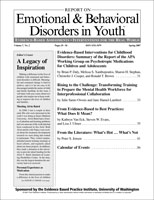Infusing Evidence-Based Practice Into a University Clinical Training Program: Improving Communication in Autistic Children
Author: Jane C. Hilton, Ph.D., CCC-SLP.; Lincoln C. Gray, Ph.D..
Source: Volume 06, Number 04, Fall 2006 , pp.75-80(6)

next article > |return to table of contents
Abstract:
In 2005, the American Speech-Language-Hearing Association (ASHA) adopted an initiative to support evidence-based practice in the assessment and treatment of persons experiencing a communication disorder. Following a medical model of research, various levels of evidence were proposed to support best practice in assessment and treatment. A natural inclusion of this initiative is to involve graduate students in all aspects of research to ensure not only their understanding of the best practice, but their realization that family/client values, as well as clinical expertise, are considerations in individualizing intervention approaches. At James Madison University’s Department of Communication Sciences and Disorders, a summer pilot research project is involving students in all phases of research. The pilot project, which involves 10 young children with autism and 15 graduate students, will examine which of two distinct, but popular, intervention strategies best supports improving the children’s communication skills. It is hoped that the graduate students involved in the project will learn to ask pertinent questions regarding evidence-based practices such as, “Is this the best practice for this individual child?”Keywords:
Affiliations:
1: Department of Communication Sciences and Disorders, James Madison University; 2: Department of Communication Sciences and Disorders, James Madison University.